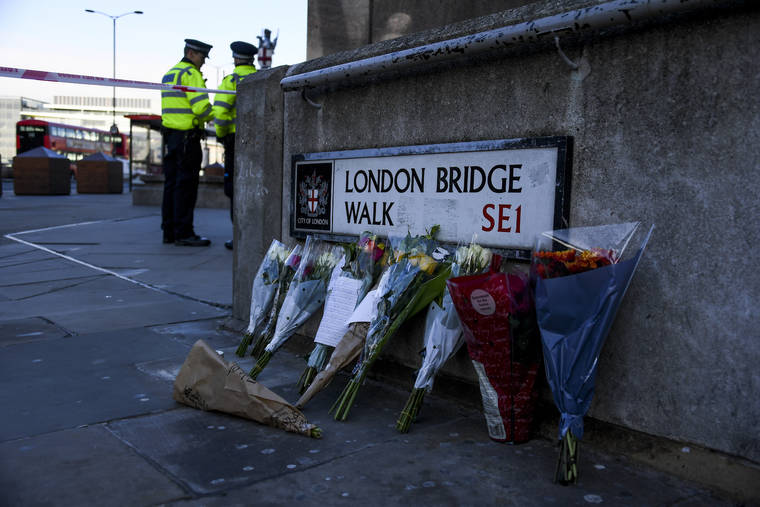LONDON — Three of the five people who were killed or wounded in the London stabbing attack were former Cambridge University students or staff members who had gathered for an event designed to connect graduate students with prisoners to study criminology, police and the university said Sunday.
The two fatalities were identified as Saskia Jones, 23, and Jack Merritt, 25, who had already been named by his family as having perished in the attack Friday near London Bridge.
“Both were graduates of the University of Cambridge and were involved in the Learning Together program — Jack as a coordinator and Saskia as a volunteer,” police said.
Started five years ago, the program was designed to bring Cambridge University graduate students together with prisoners to study criminology in an effort to reduce stigma and marginalization experienced by many inmates.
One of the wounded was identified as a university staff member. The three people survivors were not named. Officials said one was released from hospital Sunday and the others are in stable condition.
Saskia Jones’ family described her as having “a great passion for providing invaluable support to victims of criminal injustice, which led her to the point of recently applying for the police graduate recruitment program.”
The family said she wanted to specialize in victim support.
Merritt’s family said: “Jack lived his principles; he believed in redemption and rehabilitation, not revenge, and he always took the side of the underdog.”
The gathering where the attack broke out had been meant to celebrate the fifth year of the program, university Vice Chancellor Stephen Toope said.
“What should have been a joyous opportunity to celebrate the achievements of this unique and socially transformative program, hosted by our Institute of Criminology, was instead disrupted by an unspeakable criminal act,” Toope said.
The attacker, Usman Khan, was apparently attending the event and had returned for the afternoon session when he started stabbing people. Police believe he acted alone.
Khan was a convicted terrorist who had secured early release from prison. He was shot dead by police after he was restrained by civilians. Police opened fire after he flashed what looked like a suicide vest, but it was a fake device.
Dr. Vin Diwakar, medical director for the NHS in London, said doctors are dealing with the survivors’ physical injuries, but that it may be weeks before the mental trauma can be assessed.
“The psychological impact of such events sometimes only comes to light in the days and weeks afterwards,” he said.


